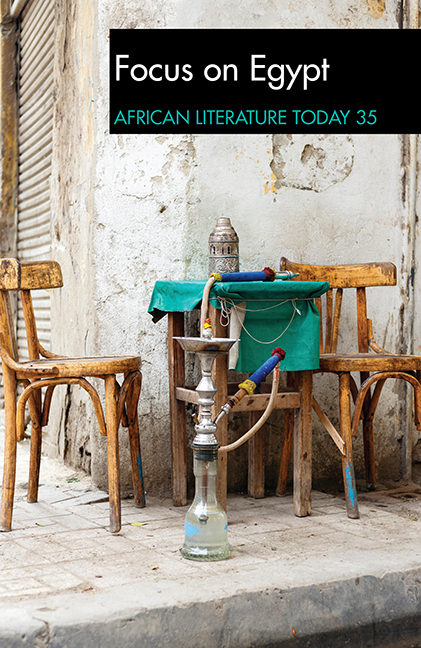Book contents
- Frontmatter
- Dedication
- Contents
- Notes on Contributors
- Foreword
- EDITORIAL ARTICLE
- ARTICLES
- FEATURED ARTICLES
- LITERARY SUPPLEMENT
- TRIBUTE
- REVIEWS
- Mohammad Rabie, Otared. Translated from Arabic By Robin Moger
- Yasser Abdel Hafez, The Book of Safety. Translated from Arabic to English by Robin Moger
- Sanya Osha, On A Sad Weather-Beaten Couch
- Adam Mayer, Naija Marxism: Revolutionary Thought in Nigeria
- NoViolet Bulawayo, We Need New Names
- Okey Ndibe, Never Look An American in the Eye: Flying Turtles, Colonial Ghosts, and the Making of a Nigerian American
- Reviews of Nigerian Poetry
Mohammad Rabie, Otared. Translated from Arabic By RobinMoger
from REVIEWS
Published online by Cambridge University Press: 24 August 2019
- Frontmatter
- Dedication
- Contents
- Notes on Contributors
- Foreword
- EDITORIAL ARTICLE
- ARTICLES
- FEATURED ARTICLES
- LITERARY SUPPLEMENT
- TRIBUTE
- REVIEWS
- Mohammad Rabie, Otared. Translated from Arabic By Robin Moger
- Yasser Abdel Hafez, The Book of Safety. Translated from Arabic to English by Robin Moger
- Sanya Osha, On A Sad Weather-Beaten Couch
- Adam Mayer, Naija Marxism: Revolutionary Thought in Nigeria
- NoViolet Bulawayo, We Need New Names
- Okey Ndibe, Never Look An American in the Eye: Flying Turtles, Colonial Ghosts, and the Making of a Nigerian American
- Reviews of Nigerian Poetry
Summary
Otared, a novel by the Egyptian writerMohammad Rabie is set in conditions that resemble those inEgypt during the Arab Spring. The situation depicted in thenovel, however, is exponentially worse than how it wasduring the Arab Spring (Or maybe the author is revealingthings that were not apparent to many people about the ArabSpring). The novel is set in an Egypt that was militarilyinvaded by the armed forces of the Republic of the Knightsof Malta who have appointed a new prime minister, and who inhis turn formed a government. The occupation government ishowever not much of a government. The country, especiallythe city of Cairo is in utter chaos. All semblance of orderhas disappeared in large parts of the city. Murder andviolence are rampant. Basic services are non-existent.Mounds of trash are everywhere. The resistance to theoccupation is led by a shadowy group of former policeofficers whose strategy is based on two elements: one, toincrease the suffering of the civilian population to thepoint they become convinced that they have no alternativebut to side with the police in their efforts to drive theinvaders away, and perhaps then the killing of civilianswould end. Two, because members of the Egyptian military arepotential competitors for power in the future, the policeencouraged military personnel to engage in armed operationsin which the latter were very likely to die or be killed.The city of Cairo is divided into two sections. East Cairowhere the occupying army is mostly based and West Cairo. Allforms of violence whether it is physical, psychological orsexual has been unleashed. There is no credible authority.The morgues are full. Cairo lies in ruins. But thissuffering does not result in solidarity and cooperationbetween the people. Nor does it engender sympathy for thedenizens of Cairo. Instead Cairenes are held in contempt forwelcoming the invaders instead of resisting them.
This is apredatory world in which many of the characters seemunhinged. Distinctions between right and wrong, truth andlies, kindness and cruelty have disappeared. Hashish andother drugs are part of the daily intake of people. Casualsex and rape are prevalent. Unproven connections betweeneating raw meat and sex are invented.
- Type
- Chapter
- Information
- ALT 35: Focus on EgyptAfrican Literature Today 35, pp. 280 - 283Publisher: Boydell & BrewerPrint publication year: 2017

